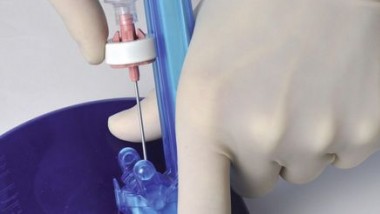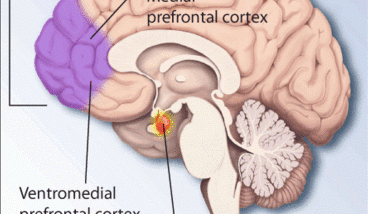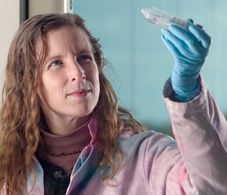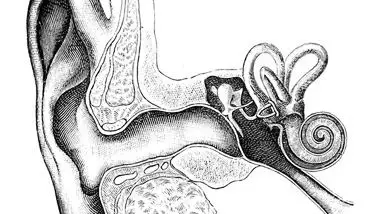AxoTrack needle AxoTrack ultrasound-guided procedure A unique patented technology developed by a emergency-room doctor is about to change the way many medical procedures involving needles are preformed and increase the success rate of first needle insertion from about 37% up ...
Pacemaker Powered by the Human Heart
An artificial pacemaker from St. Jude Medical, with electrode (Credit: Steven Fruitsmaak) Prof. Daniel J. Inman Two aerospace engineers from the University of Michigan created a revolutionary pacemaker which does not require conventional batteries. Instead the device uses vibrations which ...
Post-Traumatic Stress Disorder Prevention
The regions of the brain associated with Post-Traumatic Stress Disorder. Source: National Institutes of Health. Scientists at Northwestern University in Evanston, Illinois have developed a new treatment to prevent stressful events from triggering Post-Traumatic Stress Disorder or PTSD. Consisting of ...
Purdue Developing New Wound Healing Materials
Alyssa Panitch, an associate professor in Purdue’s Weldon School of Biomedical Engineering, peers into a sampling of a scaffold-like material that is designed to be injected into the body. The material starts off as a liquid then fastly hardens to ...
New Mechanism May Improve Hearing Aids
Diagram of the structure of the human ear. Source: MIT. Scientists at the Massachusetts Institute of Technology in Cambridge, Massachusetts have been researching how the human ear distinguishes between sounds with subtle differences. They have identified a particular mutation affecting ...
New Techniques of Bone Analysis Reveal Insights
Department Head, Department of Biomedical Engineering and Project Lead – Rensselaer Polytechnic Institute Shoulder x-ray. Rensselaer Polytechnic Institute has developed a technique using “laser-capture microscopy” that allows researchers to collect large amounts of biochemical information from nanoscale bone samples. Since ...
Treating Cluster Headaches with LSD
The chemical structure of LSD. Source: Acdx/Wikipedia. Researchers at Harvard University in Cambridge, Massachusetts have developed a new treatment for cluster headaches based on the famous psychedelic drug lysergic acid diethylamide (LSD) but without the hallucinogenic effects. The drug BOL-148 ...
Mathematical Model for Carb Loading
A researcher at Harvard University and the Massachusetts Institute of Technology in Cambridge, Massachusetts has developed an algorithm for determining how carbohydrates are burned during marathon racing, enabling runners to calculate when to eat and how much food to consume ...
New Cell therapy Will Transplanted Organ Rejection
Researchers from the University of Oxford developed a cell therapy that could prevent transplanted organs from being rejected by the body and remove the need for patient’s long term drug treatment. The rejection response (top, arrows) to a transplanted blood ...
X-Prize Tricorder Competition will Save Lives
The X PRIZE Foundation together with Qualcomm recently announced an upcoming a $10 million prize to develop a mobile solution that can diagnose patients better than or equal to a panel of board certified physicians. The challenge will be officially ...




